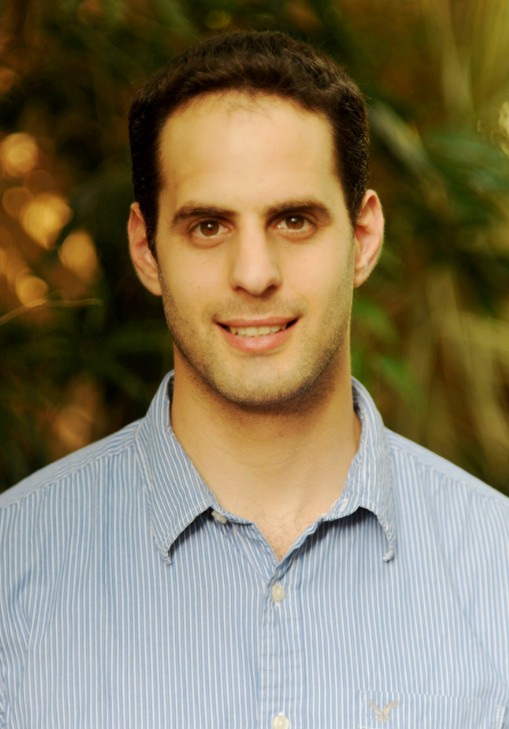Ran Bar-Yoshafat: "Israel's Battle for Advocacy Starts at Home"
Attorney Ran Bar-Yoshafat traveled abroad to advocate for Israel and returned with a new book and surprising conclusions about where the real advocacy battle lies. Also, how is it possible to be a PhD student in Israel and still struggle with Rashi script?

The struggle against hostility towards Israel seems impossible. For nearly 70 years of the state's existence, it has constantly tried to explain itself to the world. To explain why the Land of Israel. To explain why the IDF is not an army that kills innocent children. To explain why someone who blows up buses full of civilians is a terrorist and not a "freedom fighter." To explain why it is not democratic to boycott Israeli products and many other "whys" that arise periodically around the world.
Ran Bar-Yoshafat, a veteran of the Maglan unit, decided to take a six-month break from his occupations and to take on a governmental role – to explain the State of Israel. He embarked on a six-month journey across the USA, met nearly 10,000 people face to face, visited every campus willing to hear what the Israeli side had to say, and met with priests, bishops, and community leaders. He confronted "cultured" individuals convinced that "what Israel does to Arabs is what the Nazis did to you in the Holocaust."
The journey was not easy. Ran endured curses and insults, and his lectures were repeatedly interrupted by organized protests. Moreover, Ran, a resident of Ramat Hasharon, has begun observing commandments in recent years, which increased the personal challenge of such a mission. "I observe Shabbat, keep kosher food, pray three times a day, study the *daf yomi*, and recently started learning a daily page from Mishnah Berurah," he says. The mission and its difficulties led to a fascinating travel diary, now published in a book titled "I Flew to Talk About Israel."
 Ran Bar-Yoshafat
Ran Bar-YoshafatWhen and why did you decide to write a book?
"During the journey, I moved from place to place and in most of the lectures, I endured curses and insults. To cope with this, I would send letters back home – to family, to friends. Since everything was already documented, it was relatively easy to publish the book. In essence, I wrote an entire book without intending to publish one."
Despite being a 'clear-cut' academic (a lawyer, with a master's degree in history and business administration, and about to start a doctorate), Ran published a book written in a fluent and simple language. Most of his lectures were held on academic campuses, but the written experience – as expressed in his book – is accessible to all.
In the book, you describe many meetings you had specifically with Jewish communities, why is Israeli advocacy needed there?
"There is a very strong link between Jewish identity and advocacy. A Jew living in the USA – and there are almost as many Jews there as in Israel – is surrounded in his life by two things that shape his personality. Firstly, it's not popular to live with a Jewish identity. It's not 'cool' nowadays. After all, we live in a generally Western culture, so why connect to something very 'primitive'? Another thing: hatred towards Israel. When this is what an American Jew hears everywhere, it's clear he has no strength to bear it. In Western culture, not only is religion perceived as something exilic and outdated, but the entire State of Israel is depicted that way. So, if we want to address the root of the lack of sympathy towards Israel among American Jews, it's not because they don't feel sufficiently Israeli, but because they lack Jewish identity. This problem started long before 1948. When there is a Jewish identity, there is support for the State of Israel. That's why you certainly see that those who mainly work for Israel's benefit are the Orthodox communities."
So what do you tell them? I came to tell you that Moses received the Torah from Sinai?
"Jewish students in the USA seek spirituality, but unfortunately, they are much more open to foreign religions that offer it to them. Buddhism, yes. Torah, no. I usually tell them, it's great that you have a Western culture, but don't oppose identity. Just as I love my mother more than another mother and don't try to search for advantages of another mother, why are you adopting every other identity except your biological mother? Your biological mother is the people of Israel."
And as someone who observes the commandments, did you find it challenging to maintain a religious lifestyle on this journey?
"Definitely. Observing Shabbat in a place where you are the only Orthodox Jew and need to make considerable efforts to find kosher food and not desecrate Shabbat is not easy at all. I was invited for Shabbat to a city where I had a lecture, and the small number of Jews there are Reform. Of course, I cannot be hosted by them. Usually, there were *Chabad* houses that saved me. Once, I spent a Shabbat in a camp where I was the only commandment-observing Jew. I brought wine and challah, but my sleeping bag arrived only after Shabbat started. I didn't know if I was allowed to use and enjoy it, because Shabbat had been desecrated on it. Obviously, I had no one to ask and preferred to be strict. I found myself in the cold covered only by my jacket. It was not pleasant. By the way, I'm not a halachic authority, but I later inquired about the matter and it turns out it was easier than I thought. I was allowed to use the sleeping bag to protect myself from the cold."
Ran says that during the mission, it dawned on him that among the nations of the world, the connection between being Jewish and observing commandments is essential. "Before Passover, I gave a lecture in a mosque in the city of Lynwood. I didn't attach importance to the date we were at, because what do they have to do with it? But they kept asking me about the Exodus from Egypt. It amused me; they were genuinely interested in Judaism. I explained and answered them, but I asked them why they were interested. Their explanation was amazing: 'We know one thing about Judaism, and see another in reality. We know not everything is allowed to be eaten, and we see that everyone here eats whatever they want.' It seemed strange to them that there are Jews who don't follow the rules of Judaism."
You describe how deeply Jewish identity has been affected; the question is what can be done? Is the State of Israel doing enough in your opinion?
"It's easiest to criticize the state, and I also like doing so. When there was a Ministry for Public Diplomacy, the miss was, in my opinion, that they invested a lot of energy in explaining to the world how we invented cherry tomatoes and various other inventions. It amuses me because if someone hates you because you 'merely' kill Arab kids, they're not exactly impressed by what you invented. Nonetheless, I know that the state does a lot, and not everything can be publicized. I think investment should be channeled into the educational direction. An act of education is something that never ends. We need to keep talking about it. But the main insight I have is that every mission starts here. Israel's battle for advocacy starts here, at home. We also need to discuss Jewish identity here. I grew up in a very cultured place, completed several academic degrees, and am now starting a doctorate, yet I still struggle to read Rashi script... There's something absurd here. They gave me a lot of knowledge but took away my identity. Everything is important, but we just need to remember who we really are."

